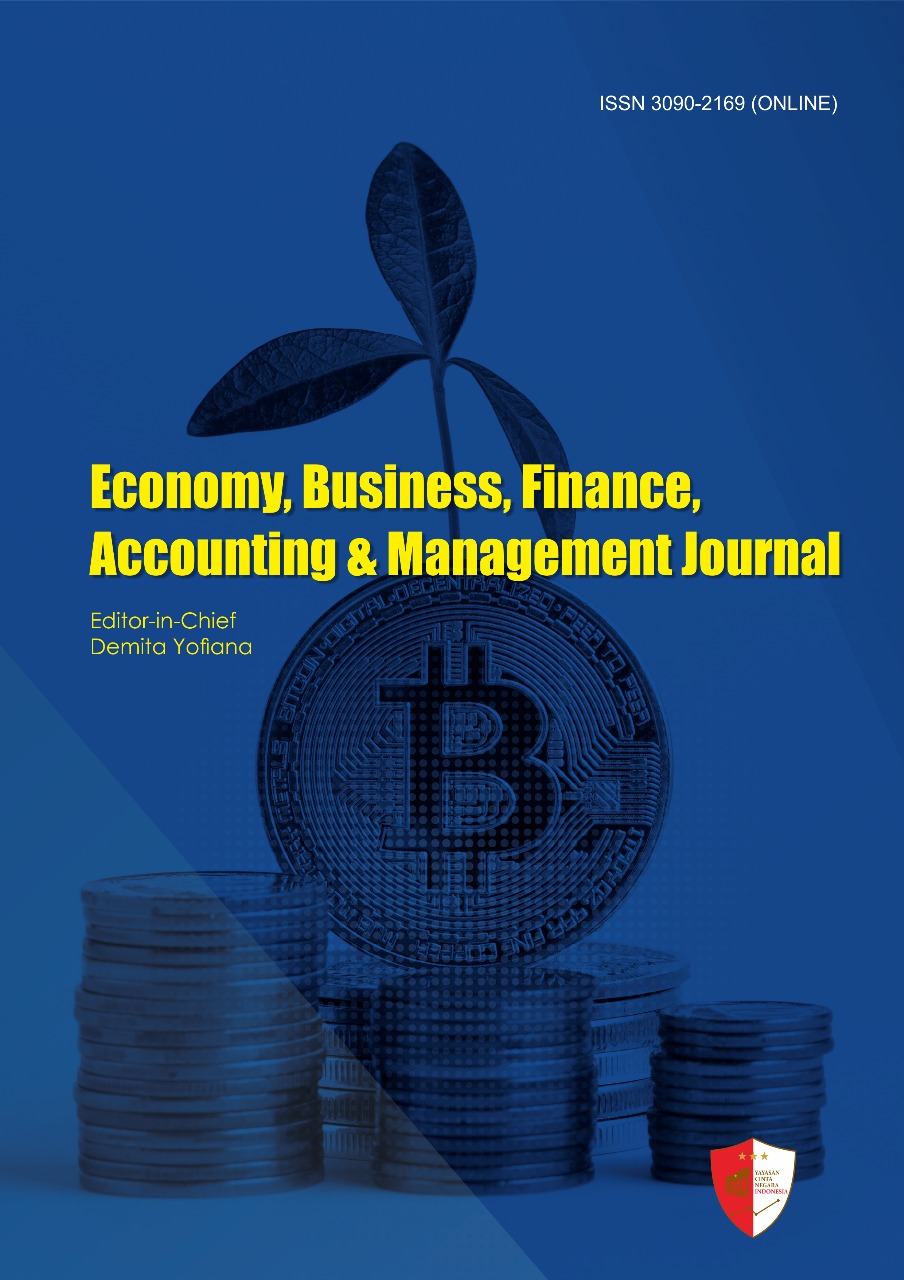Digital Economy as a Catalyst for Financial Inclusion in Indonesia: Evaluating Impact and Uncovering Challenges
Keywords:
Challenges, Digital Divide, Digital Economy, Financial Inclusion, PolicyAbstract
This study aims to evaluate the impact of the digital economy on financial inclusion in Indonesia and analyze the challenges faced in its implementation. In recent years, the rapid development of digital technology has opened up great opportunities to expand access to financial services in Indonesia, especially for people who were previously unreached by the traditional banking system. However, despite significant progress, there are still various obstacles that hinder the achievement of optimal financial inclusion, such as the digital divide, low financial literacy, and data security issues. This research uses a qualitative and quantitative approach by analyzing data from various sources, including surveys of digital financial service users, government reports, and case studies of digital financial inclusion policy implementation. The results show that the digital economy has great potential to improve financial inclusion, but the main challenges lie in the technology access gap, socio-economic inequality, and the need to strengthen data protection and transaction security regulations. Based on these findings, this study provides policy recommendations involving digital infrastructure upgrades, digital financial literacy education, and strengthened security regulations to support the achievement of greater financial inclusion in Indonesia. It also suggests further studies to understand the long-term impact of the digital economy on reducing social and economic inequality and the effectiveness of existing policies
References
Adel, N. (2024). The impact of digital literacy and technology adoption on financial inclusion in Africa, Asia, and Latin America. Heliyon, 10(24).
Adhi et al., 2020. (2020). Pengantar Metodologi Penelitian. In Antasari Press.
Al-Shami, S. A., Damayanti, R., Adil, H., & Farhi, F. (2024). Financial and digital financial literacy through social media use towards financial inclusion among batik small enterprises in Indonesia. Heliyon, 10(15).
Alhammadi, S. (2023). Expanding financial inclusion in Indonesia through Takaful: opportunities, challenges and sustainability. Journal of Financial Reporting and Accounting.
Alwahidin, N., Jufra, A., Mulu, B., & Sari, K. N. (2023). A New Economic Perspective: Understanding The Impact Of Digital Financial Inclusion On Indonesian Households Consumption. Bulletin of Monetary Economics and Banking, 26(2), 333–360.
Aminullah, E., Fizzanty, T., Nawawi, N., Suryanto, J., Pranata, N., Maulana, I., Ariyani, L., Wicaksono, A., Suardi, I., & Azis, N. L. L. (2024). Interactive components of digital MSMEs ecosystem for inclusive digital economy in Indonesia. Journal of the Knowledge Economy, 15(1), 487–517.
Banna, H., & Alam, M. R. (2021). Impact of digital financial inclusion on ASEAN banking stability: implications for the post-Covid-19 era. Studies in Economics and Finance, 38(2), 504–523.
Bharwani, R. (2024). The Impact of Digitalization on Informal Roadside Businesses in Indonesia and its Contribution to GDP.
Chen, Y., Kumara, E. K., & Sivakumar, V. (2021). Invesitigation of finance industry on risk awareness model and digital economic growth. Annals of Operations Research, 1–22.
Gautam, R. S., Rastogi, S., Rawal, A., Bhimavarapu, V. M., Kanoujiya, J., & Rastogi, S. (2022). Financial technology and its impact on digital literacy in India: Using poverty as a moderating variable. Journal of Risk and Financial Management, 15(7), 311.
Hassan, A., Abd El-Aziz, R., & Hamza, M. (2020). The Exclusion of people with visual disabilities from digital banking services in the digitalization era. Journal of Electronic Banking Systems, 2020.
Kania, R. (2022). Why and how financial inclusion policy develop? A case study from Indonesia. University of Birmingham.
Li, K., Kim, D. J., Lang, K. R., Kauffman, R. J., & Naldi, M. (2020). How should we understand the digital economy in Asia? Critical assessment and research agenda. Electronic Commerce Research and Applications, 44, 101004.
Muhammad Syahrum, S. T. (2022). Pengantar Metodologi Penelitian Hukum: Kajian Penelitian Normatif, Empiris, Penulisan Proposal, Laporan Skripsi dan Tesis. CV. Dotplus Publisher.
Nasution, L. N., Sadalia, I., & Ruslan, D. (2022). Investigation of Financial Inclusion, Financial Technology, Economic Fundamentals, and Poverty Alleviation in ASEAN-5: Using SUR Model. ABAC Journal, 42(3), 132–147.
Nuzulia, A. (1967). Metode PENELITIAN. Angewandte Chemie International Edition, 6(11), 951–952., 5–24.
Pangestu, M., & Dewi, G. (2018). 13. Indonesia and the digital economy: creative destruction, opportunities and challenges. Digital Indonesia, 9789814786003–9789814786019.
Pazarbasioglu, C., Mora, A. G., Uttamchandani, M., Natarajan, H., Feyen, E., & Saal, M. (2020). Digital financial services. World Bank, 54, 1–54.
Purbasari, R., Muttaqin, Z., & Sari, D. S. (2021). Identification of actors and factors in the digital entrepreneurial ecosystem: The case of digital platform-based MSMEs in Indonesia. Review of Integrative Business and Economics Research, 10, 164–187.
Purnamawati, S. A., Nuryasinta, R. K., Setyawan, F. R., Alam, S., Luthfi, M., Fajrin, Y. A., & Wardoyo, Y. P. (2024). Digital Rupiah as a Proponent of Financial Inclusion: A Study of Legal Strengthening Aspects. KnE Social Sciences, 1–14.
Rahayu, S. K., Budiarti, I., Firdauas, D. W., & Onegina, V. (2023). Digitalization and informal MSME: Digital financial inclusion for MSME development in the formal economy. Journal of Eastern European and Central Asian Research (JEECAR), 10(1), 9–19.
Riyanto, F. D. (2022). Synergy of digitalization of payments and development of MSMEs: A strategy to promote regional equality of the Sumatra province economy.
Rizki, A., & Hendarman, A. F. (2024). Empowering financial and digital literacy to build resilience of MSMEs: Proposed implementation in Bandung City. International Journal of Current Science Research and Review, 7(10).
Saifurrahman, A., & Kassim, S. H. (2024). Regulatory issues inhibiting the financial inclusion: a case study among Islamic banks and MSMEs in Indonesia. Qualitative Research in Financial Markets, 16(4), 589–617.
Salam, U., Lee, S., Fullerton, V., Yusuf, Y., Krantz, S., & Henstridge, M. (2018). Indonesia case study: Rapid technological change–challenges and opportunities. Pathways for Prosperity Commission Background Paper Series.
Sanga, B., & Aziakpono, M. (2023). FinTech and SMEs financing: A systematic literature review and bibliometric analysis. Digital Business, 100067.
Saraswati, B. D., Maski, G., Kaluge, D., & Sakti, R. K. (2020). The effect of financial inclusion and financial technology on effectiveness of the Indonesian monetary policy. Business: Theory and Practice, 21(1), 230–243.
Setiawan, B. (2024). Fintech and financial inclusion: Cross country study comparing Indonesia and Hungary. Magyar Agrár-és Élettudományi Egyetem.
Shofawati, A. (2019). The role of digital finance to strengthen financial inclusion and the growth of SME in Indonesia. KnE Social Sciences, 389–407.
Sudiantini, D., Rizky, P. P., & Hazarika, A. (2023). Digital economy and financial inclusion in reviving the national economy: A Management Strategy. Revenue Journal: Management and Entrepreneurship, 1(1), 64–75.
Sun, P. (2020). Security and privacy protection in cloud computing: Discussions and challenges. Journal of Network and Computer Applications, 160, 102642.
Wirdiyanti, R., Yusgiantoro, I., Sugiarto, A., Harjanti, A. D., Mambea, I. Y., Soekarno, S., & Damayanti, S. M. (2023). How does e-commerce adoption impact micro, small, and medium enterprises’ performance and financial inclusion? Evidence from Indonesia. Electronic Commerce Research, 23(4), 2485–2515.
Downloads
Published
Issue
Section
License
Copyright (c) 2025 Patricia Glory, Rian Alexa (Author)

This work is licensed under a Creative Commons Attribution-NonCommercial 4.0 International License.





